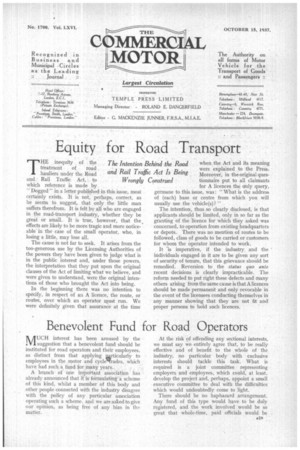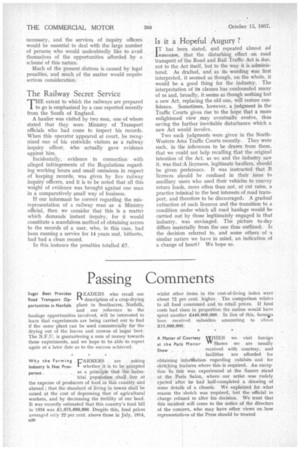Benevolent Fund for Road Operators 4UCH interest has been aroused
Page 37

Page 38

If you've noticed an error in this article please click here to report it so we can fix it.
by the IVI suggestion that a benevolent fund should be instituted for road operators and their employees, as distinct from that applying articularly to • employees in the ,motor and cycleltrades, which have had such a fund for inany years. A branch of one important association has already announced that it is formulating a scheme of this kind, whilst a member of this body and other people connected with the industry disagree with the policy of any particular association operating such a scheme, and we are asked to give our opinion, as being free of any bias in the matter. At the risk of offending any sectional interests, we must say we entirely agree that, to be really effective and of benefit to the whole of the inddstry, no particular body with exclusive interests should tackle this task. What is required is a joint committee representing employers and employees, which could, at least, develop the project and, perhaps, appoint a small executive committee to deal with the difficulties which would undoubtedly come to light.
There should be no haphazard arrangement. Any fund of this type would have to be duly registered, and the work involved would be so great that whole-time, paid officials would be necessary, and the services of inquiry officers would be essential to deal with the large number of persons who would undoubtedly like to avail themselves of the opportunities afforded by a schem of this nature.
Much of the present distress is caused by legal penalties, and much of the matter would require serious consideration.
The Railway Secret Service
THE extent to which the railways are prepared to go is emphasized by a case reported recently from the South of England.
A haulier was visited by two men, one of whom stated that they were Ministry of Transport officials who had come to inspect his records. When this operator appeared at court, he recognized one of his erstwhile visitors as a railway inquiry officer, who actually gave evidence against him.
Incidentally, evidence in connection with alleged infringements of the Regulations regarding working hours and small omissions in respect of keeping records, was given by five railway inquiry officers, and it is to be noted that all this weight of evidence was brought against one man in a comparatively small way of business.
If our informant be correct regarding the misrepresentation of a railway man as a Ministry official, then we consider that this is a matter which demands instant inquiry, for it would constitute a scandalous method of obtaining access to the records of a user, who, in this case, had been running a service for 14 years and, hitherto, had had a clean record.
In this instance the penalties totalled E7.
Is it a Hopeful Augury It
I T has been stated, and repeated almost ad nauseam, that the disturbing effect on road transport of the Road and Rail Traffic Act is due, not to the Act itself, but to the way it is administered. As drafted, and as its wording was first interpreted, it seemed as though, on the whole, it would be a good thing for the industry. The interpretation of it! clauses has confounded many of us and, broadly, it seems as though nothing but a new Act, replacing the old one, will restore confidence. Sometimes, however, a judgment in the Traffic Courts gives rise to the hope that a more enlightened view may eventually evolve, thus saving the further inevitable disturbance which a new Act would involve.
Two such judgments were given in the NorthWestern Area Traffic Courts recently. They were such, in the inferences to be drawn from them, that we could not help recalling that the original intention of the Act, as we and the industry saw it, was that A licensees, legitimate hauliers, should be given preference. It was instructed that B licences should be confined in their issue to ancillary users who used their vehicles to convey return loads, more often than not, at cut rates, a practice inimical to the best interests of road transport, and therefore to be discouraged: A gradual extinction of such licences and the transition to a condition under which all road haulage would be carried out by those legitimately engaged in that industry, was envisaged. The picture to-day differs materially from the one thus outlined. Is the decision referred to, and some others of a similar nature we have in mind, an indication of a change of heart? We hope so.




































































































